Australian Outback Camping
Camping Guide Books - Free Camping In The Outback
The Australian Outback is made for camping holidays.
It doesn't matter if you hire a campervan for a month or if you throw your tent and sleeping bag in the back of any old car and just go...
Whether you take a year to do the big once around Australia camping trip, join a three week desert safari or a three day camping tour, or even if you go camping for just one night...
Camping in the Australian Outback is something you'll remember forever. The vastness of the place, the solitude and serenity, the campfire, the millions and millions of stars...
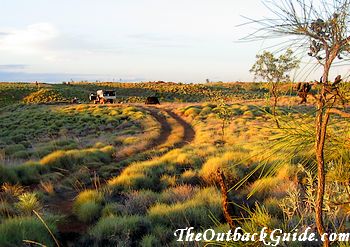
There is something incredibly humbling about the Outback, and a night at the campfire really drives that point home. An amazing experience, most profound if you come from a very populated part of the planet...
I've lived here for many years now, and I've spent countless nights camping in the Australian Outback. The magic never wears off. The sense of space and freedom you feel can't be described or explained.
And to experience it you have to go camping. Looking at some sights during the day and returning to a hotel at night won't do the trick...
There is no better way to travel through the Australian Outback than camping. If you go camping in Australia you can stay anywhere, any time, at low or no cost. (I'll tell you more about the "no cost" aspect below.)
You are free to do what you want, when you want and where you want. Mostly. There are of course some restrictions and some things you need to know:
- What You Need To Know To Go Camping In The Australian Outback
- What You Need To Bring For Your Outback Australia Camping Adventure
- The Best Australian Camping Guide Books
- About Campervan Hire in Australia
Camping In Australia
What You Need To Know
Australia is a nation of campers and you can find campgrounds and caravan parks everywhere. EVERYWHERE! No matter how remote the area, if there is any sign of humans there is somewhere to camp. If you plan big camping a trip get one of the big guide books, and you'll have no problems to find a beautiful place every night.
Even as you travel across the Australian Outback there are still small towns, roadhouses and private property owners who operate caravan parks. If you need power and a hot shower you'll find it.
But now lets venture into the real Australian Outback. Once you leave civilisation behind there are many official free campsites and rest areas along the major highways that cross the Australian Outback.
Campgrounds can also be found in national parks and reserves and on pastoral properties. In these areas you are restricted to the official campgrounds only, but outside the parks and private lands there are the many unofficial campsites that can be found, well, anywhere...
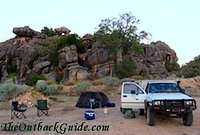
Camping in the Australian Outback often means bushcamping. Bushcamping is basically free camping minus the amenities.
In most of Outback Australia you get away with bushcamping and you shouldn't have any problems finding a nice site.
Restrictions apply on private property. A lot of the Australian Outback is cattle country and you must contact the station owners and ask for permission before you pitch your tent. Some of the stations have beautiful gorges, waterfalls, creeks and swimming holes, and if you ask nicely you are often allowed to spend a night there.
If you are near towns or near the bigger tourist attractions you might also find regulations and restrictions. But the deeper you venture into the Outback the more freedom you have to camp wherever you like.
A good Australia camping guide book for the area you plan to visit is a very worthwhile investment. It'll save you a lot more money than it will cost you, and it contains all the info about rules and regulations that you need.
There are some general rules and etiquette that apply everywhere. Please, please follow them closely. Since tourist numbers are constantly increasing it is really important that everybody makes this effort.
As the saying goes, "Take nothing but pictures, leave nothing but footprints". The main aim should be to have as little impact as possible. It shouldn't even be necessary to say this, but I know from experience that it is:
Take your rubbish with you!! Yes, you! All of it!
Don't use soap and detergents in creeks and streams. If you have to use them at all do it at least 50 metres from the water's edge.
If you have to have a campfire use wood very sparingly. It's a scarce resource in the Outback and very slow to regenerate. Also, any dead wood lying on the ground is housing or feeding someone. Leave the big hollow logs alone. Make a campfire not a bonfire. Many national parks will not allow any fires, others will allow fires but you are not allowed to collect wood in the park, or only in designated areas.
You also need to comply with the fire bans that will be in place across much of Australia in summer. Don't rely on a campfire for your cooking, take a gas stove or camping oven as well.
Apart from that all the usual common sense rules for travel in the Outback apply to Outback camping as well: if you venture into really remote areas let someone know where you are going, get information about the road conditions and the weather, take a good map and take enough water. You can never carry too much water. Period.
Australian Outback Camping
What You Need To Bring
What you need to bring depends on how much comfort and luxury you need. And on where you are going, for how long, and the time of the year. Many Australians go on month long trips across the Australian Outback, towing caravans or camper trailers.
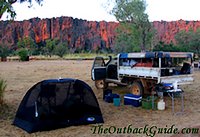
Tourists hire campervans in Australia and live in them for many weeks. Others might just want to go camping in the Outback for one or a few nights.
To give you an idea of what you should take I'll let you know what I load into my car (no camper trailer or similar for me) for a short weekend trip and why. Here's my camping check list:
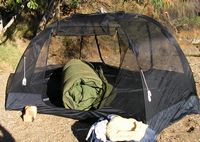
Something to sleep in. I, like most Aussies, have a swag (a real bed that can be rolled up for transport), but you will most likely take a sleeping bag and a foam or insulating pad to go underneath.
A tent is optional (many prefer it for the privacy). It's nice to have if it's cold or wet, but during hot nights a mosquito dome or mozzie net is the way to go.
A big tarp and some tent poles and ropes to rig up some shade. Camping chairs and a table. (All optional on short camping trips, you can find a shady tree, and sit on rocks and logs, or your bag...)
Some kind of camping cooker is a must.
So is an esky (an ice box) to keep food cold (and the beer!). Blocks of ice can be bought absolutely everywhere. You can get super cheap foam eskies at the supermarkets here.
Plenty of water, spare fuel, enough ice. Maybe fire wood, depending on where I'm going.
A torch!
That's about it. Other than that you just need the usual stuff: your clothes, towel, tooth brush, toilet paper etc...
Many people buy some sort of camping shower. I prefer to camp where I can go for a swim in the evening. If all else fails or my hair is in desperate need for some shampoo I'll have a hot shower at a roadhouse. Wherever you can buy diesel in the Australian Outback you can usually also have a shower...
For cooking: whatever food you require, cooking utensils, plates and cutlery, salt, pepper, oil... Remember the can opener if you take cans, and the corkscrew for the wine.
Handy items: torch, spare batteries, insect repellent, matches and/or lighter, bowl or bucket for the dishes, dishwashing liquid, paper towels, kitchen towel, rubbish bags...
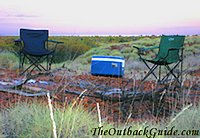
What did I forget? I always forget something. I've got the corkscrew...
A lot of the above is optional. As I said, it depends for how long and where you are going. Just test it out for a short period and you'll soon find out what you're missing.
Only going for one night? A sleeping bag, a few beers and a can of baked beans should do it... Now that'll be an authentic Aussie Outback camping night...
Campervan Hire | Australia Camping Guide Books | Return to top
Find more articles and information about the Australian Outback
Return to Outback Australia Travel Guide home page





